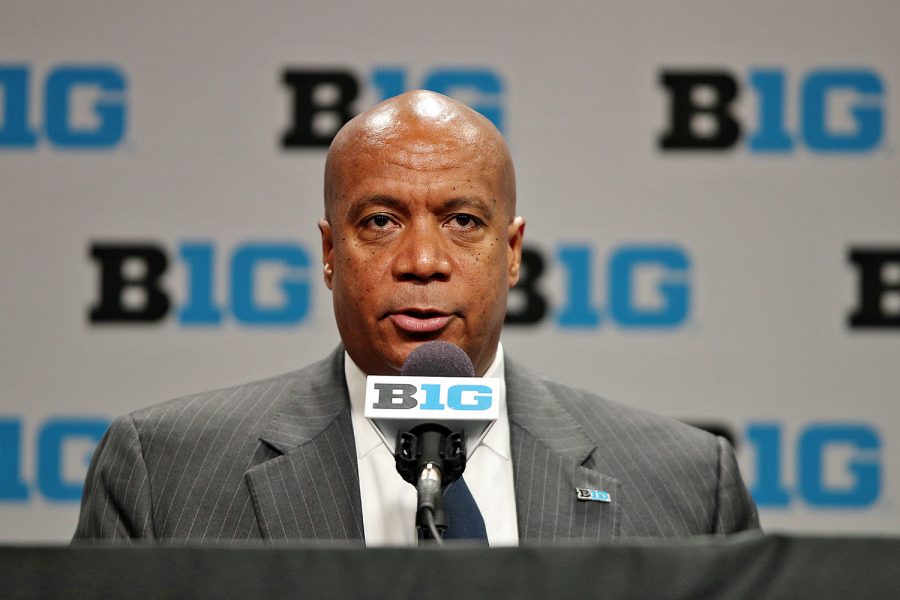Big Ten Commissioner Kevin Warren says conference’s decision to postpone fall sports ‘will not be revisited’
In an open letter released on Wednesday, Warren addressed the criticism the conference is receiving.
Big Ten Conference Commissioner Kevin Warren addresses reporters regarding the cancellation of the 2020 Big Ten men's basketball tournament at Bankers Life Fieldhouse in Indianapolis, on Thursday, March 12, 2020.
August 19, 2020
Big Ten Commissioner Kevin Warren released an open letter on Wednesday and shared that the conference’s decision to postpone fall sports due to COVID-19 will not be revisited.
The Big Ten Conference has been subject to criticism over the past week after announcing Aug. 11 that fall sports had been postponed in the conference due to ongoing health and safety concerns related to the COVID-19 pandemic. Much of that criticism has stemmed from the conference’s lack of transparency.
In the letter, Warren said that he understands the disappointment in response to the conference’s decision and wanted to share additional points behind the decision. Warren noted that the vote by the Big Ten Council of Presidents and Chancellors (COP/C) was “overwhelmingly in support” of postponing fall sports.
“The decision was thorough and deliberative, and based on sound feedback, guidance and advice from medical experts.” Warren wrote in the letter. “Despite the decision to postpone fall sports, we continue our work to find a path forward that creates a healthy and safe environment for all Big Ten student-athletes to compete in the sports they love in a manner that helps to prevent the spread of COVID-19 and protects both student-athletes and the surrounding communities.”
An Open Letter to the Big Ten Communityhttps://t.co/rccZCH1Sj3
— Big Ten Conference (@bigten) August 19, 2020
Warren listed these points as the primary factors behind the COP/C decision:
- “Transmission rates continue to rise at an alarming rate with little indication from medical experts that our campuses, communities or country could gain control of the spread of the virus prior to the start of competition.”
- “As our teams were ramping up for more intense practices, many of our medical staffs did not think the interventions we had planned would be adequate to decrease the potential spread even with very regular testing.”
- “As the general student body comes back to campus, spread to student-athletes could reintroduce infection into our athletics community.”
- “There is simply too much we do not know about the virus, recovery from infection, and longer-term effects. While the data on cardiomyopathy is preliminary and incomplete, the uncertain risk was unacceptable at this time.”
- “Concerns surrounding contact tracing still exist, including the inability to social distance in contact sports pursuant to the Centers for Disease Control and Prevention (CDC) guidelines. While risk mitigation processes (e.g., physical distancing, face coverings, proper hygiene, etc.) can be implemented across campus for the student body population, it became clear those processes could not be fully implemented in contact sports.”
- “With the start of full-contact practices and competitions, it became increasingly clear that contact tracing and quarantining would risk frequent and significant disruptions to the practice and competition calendar.”
- “Accurate and widely available rapid testing may help mitigate those concerns, but access to accurate tests is currently limited.”
- “Significant concerns also exist regarding the testing supply chain, generally, for many of our institutions.”
The Big Ten’s decision was announced six days after the conference released its new 2020 football schedule.
On Aug. 14, parents of Iowa football players wrote a letter addressed to Warren and the Big Ten Council of Presidents and Chancellors asking for more transparency from the conference. Parents from several other schools from around the conference have done the same.
RELATED: Iowa football parents asking for transparency from Big Ten
In the letter, Iowa football parents “strongly encouraged” the Big Ten to reconsider playing the fall college football season.
“We understand the passion of the many student-athletes and their families who were disappointed by the decision, but also know there are many who have a great deal of concern and anxiety regarding the pandemic,” Warren wrote.
Financial considerations did not influence the COP/C decision, Warren wrote.
Iowa athletic director Gary Barta said in a letter to football season ticket holders Monday that the athletic department anticipates approximately $100 million in lost revenue and an overall budget deficit of between $60-75 million following the Big Ten’s decision.
RELATED: Iowa AD Gary Barta anticipates $100 million in lost revenue following postponement of fall sports
The Big Ten and the Pac-12 are the only Power Five conferences that have postponed fall sports. The ACC, Big 12, and SEC are still scheduled to compete athletically this fall.
NCAA President Mark Emmert said Aug. 13 that NCAA Division I fall championships have been postponed. According to a report Wednesday by national college football reporter Pete Thamel of Yahoo Sports, the NCAA Division I Council approved the recommendation to move fall championships to the spring.
This decision does not apply to the College Football Playoff, which is not an NCAA event but is run by the conferences.
Upon postponing the fall seasons, the Big Ten said it will continue to monitor a number of options regarding those sports, including possibly playing them in the spring.
“In evaluating winter/spring models, we will explore many factors including the number of football games that can reasonably be played from a health perspective in a full calendar year while maintaining a premier competitive experience for our student-athletes culminating in a Big Ten Championship,” Warren wrote. “The Big Ten Conference will continue to collect feedback from student-athletes, families, and other constituents and remains in active discussions with its television partners regarding all future plans.”















